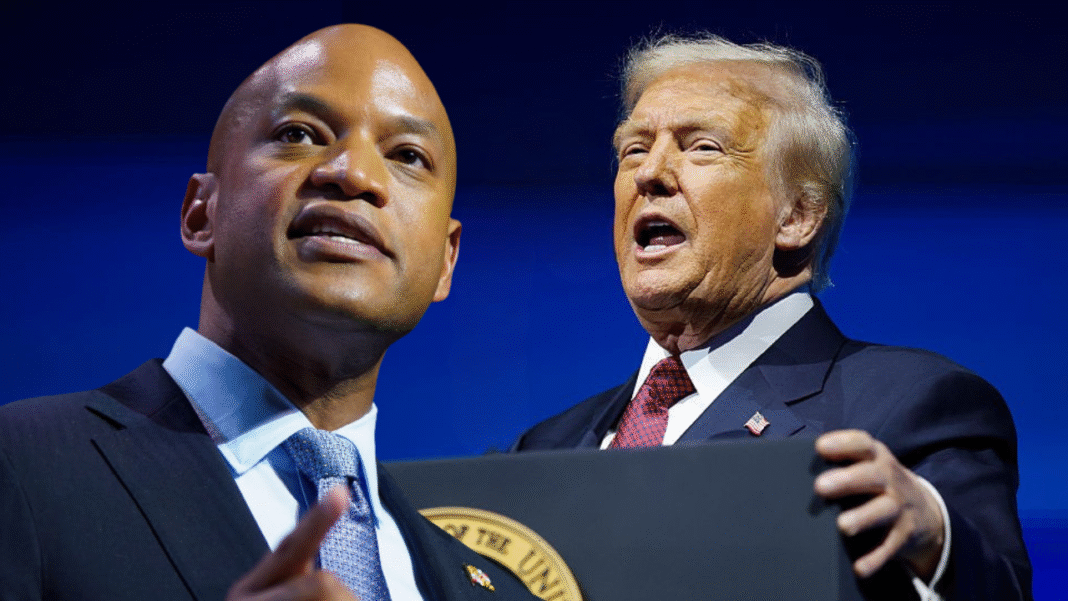The Impasse: Trump’s SNAP Funding Controversy Amid Government Shutdown
As the 42-day government shutdown appears on the verge of resolution, another storm brews over food assistance programs, particularly the Supplemental Nutrition Assistance Program (SNAP). Despite mounting pressure and the clear needs of millions, President Donald Trump staunchly resists a court order to fully fund SNAP as Thanksgiving approaches.
The Administration’s Stance
The Trump administration has escalated tensions, demanding that states retract efforts to fully distribute SNAP benefits amidst ongoing legal battles. The U.S. Department of Agriculture warns that states that do not comply may face fiscal repercussions. This hardline approach poses a direct challenge to various states attempting to look out for the welfare of their citizens, particularly during a holiday season traditionally centered around abundance and gratitude.
Maryland’s Response
In response to the federal impediments, Maryland Governor Wes Moore has taken a bold stance. Recognizing the pressing need for food assistance, he has allocated $62 million in emergency relief funding for nearly 700,000 SNAP recipients in the state. This funding comes from the state’s Fiscal Discipline Fund, sourced from capital gains tax revenues—a creative solution to circumvent federal gridlock.
Legal and Ethical Obligations
Governor Moore asserts that the federal government has a legal obligation to provide full funding for SNAP. In a recent interview, he expressed frustration over the administration’s refusal to comply with court orders, stating, “I’m going to not wait for the President of the United States to stop doing these temper tantrums inside of courtrooms.” His proactive approach reflects an ethical commitment to uphold the welfare of vulnerable populations, particularly as the shutdown prolongs.
The Supreme Court Ruling
On November 7, the Supreme Court ruled in favor of allowing the Trump administration to delay full SNAP payments until November 13. This decision heightens the urgency for state administrations like Maryland’s to act decisively, as the threat of hunger looms over millions. Approximately 42 million Americans, including 11 million Black Americans, are at risk of going hungry if SNAP benefits remain restricted.
The Impact on Families
As Maryland prepares to disburse emergency funding, questions remain about whether this aid will be sufficient to bridge the gap created by the federal government’s hesitance. Moore emphasizes his commitment: “We’re not going to allow our people to go without food while we’re waiting for federal judges to determine whether or not Donald Trump’s gonna follow the law.” This sentiment resonates with a growing concern among governors and local leaders across the nation who are grappling with the implications of the administration’s decisions.
A Commitment to Community
Despite the legislative obstacles, Gov. Moore has shown unwavering resolve. He pledges to continue supporting residents for as long as feasible, stating, “I’ve been clear that we are going to, for as long as we can, ensure that our people are not gonna be left behind by the actions of the federal government.” His resolve demonstrates a commitment to prioritizing his constituents’ needs over political maneuvering.
The Future of SNAP Funding
As negotiations and legal battles unfold, the timeline for comprehensive food assistance remains uncertain. Maryland’s response may be a critical case study on how state-level interventions can mitigate the impact of federal inaction. Moore expresses a clear frustration with the Trump administration, declaring, “I’m also not going to wait or hold my breath for the Trump-Vance administration to find religion about why food should not be used as a weapon.” His fortitude highlights a growing narrative among state leaders who refuse to accept the status quo.
In this complicated landscape, the implications of this ongoing struggle extend beyond immediate food assistance; they tap into deeper issues of governance, ethics, and the responsibilities of leadership in times of crisis. As the conversation evolves, the focus remains on the people who are most affected, drawing attention to the essential role of effective governance in ensuring the dignity and sustenance of all citizens.



